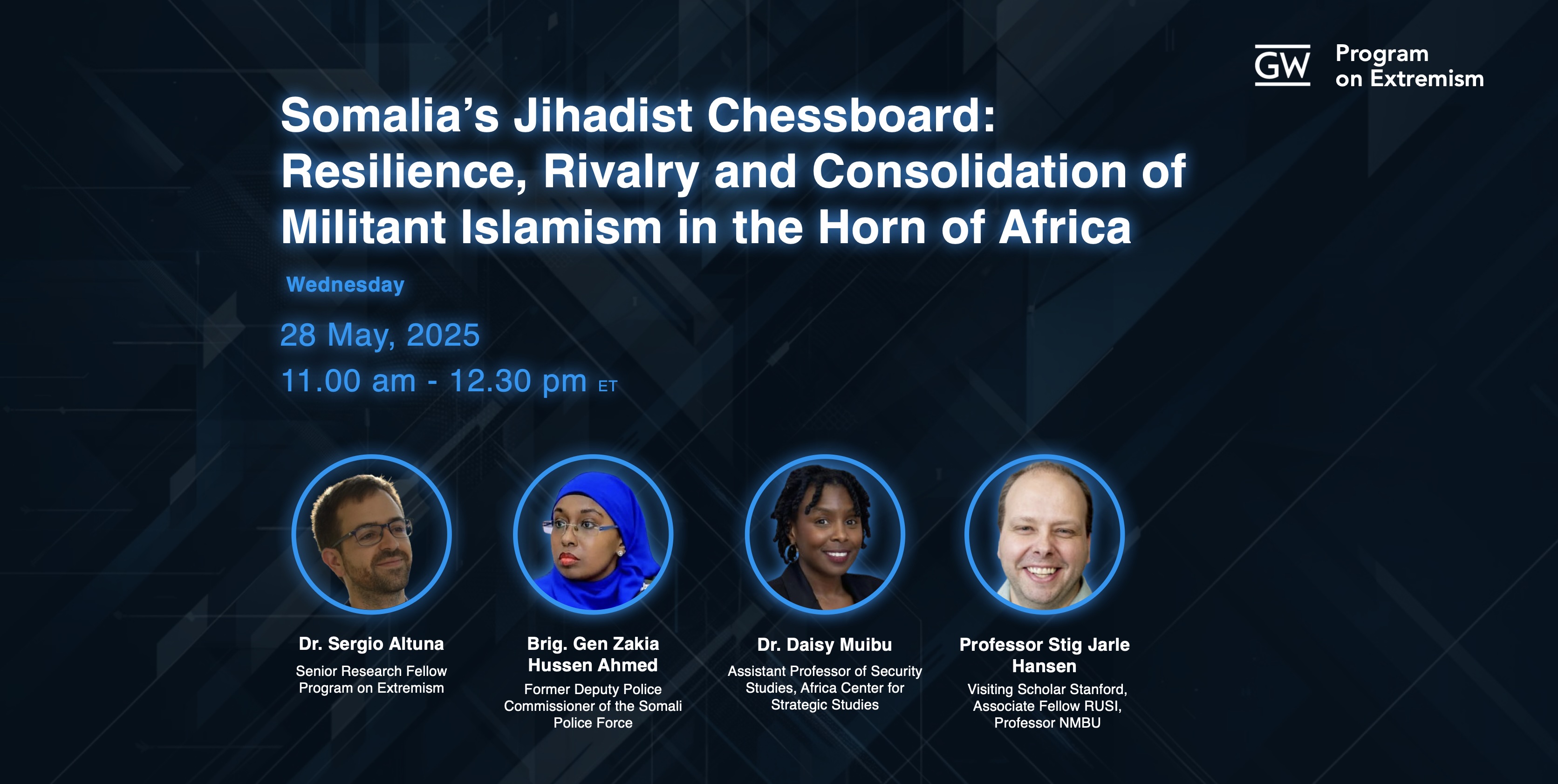Somalia’s Jihadist Chessboard
Resilience, Rivalry and Consolidation of Militant Islamism in the Horn of Africa
On May 28, the Program on Extremism at The George Washington University hosted a high-level panel discussion on the evolving jihadist landscape in Somalia.
Since early 2025, Somalia has witnessed a notable escalation in jihadist activity. Al-Shabaab has intensified its operations, including a major offensive in the Middle Shabelle region, while the Islamic State’s Somalia branch has significantly expanded over the past year, emerging as a key financial and logistical hub within the broader ISIS network. In response, the United States has ramped up its airstrikes against jihadist operatives in the country, highlighting growing international concern over the region’s deteriorating security environment.
This event explored the shifting dynamics of jihadist competition and consolidation in Somalia, analyzing the factors underpinning militant resilience and assessing the broader implications for regional security. The panel also examined the role of local governance structures, community dynamics, and the influence of external actors in shaping the trajectory of violent extremism across the country.
The Program on Extremism hosted:
- Brig. Gen Zakia Hussen Ahmed, former Deputy Police Commissioner of the Somali Police Force.
- Professor Stig Jarle Hansen, Visiting Scholar Stanford, Associate Fellow RUSI, Professor NMBU.
- Dr. Daisy Muibu, Assistant Professor of Security Studies at the Africa Center for Strategic Studies.
The discussion was moderated by Dr. Sergio Altuna, Senior Fellow at the Program on Extremism and Project Lead for TITAN.
On May 28, 2025, the Program on Extremism (PoE) at The George Washington University hosted a virtual, high-level panel discussion on the evolving jihadist landscape in Somalia. Moderated by Dr. Sergio Altuna, Senior Research Fellow at PoE and Project Lead for TITAN, the panel featured Brigadier General Zakia Hussen Ahmed and Professor Stig Jarle Hansen. Dr. Daisy Muibu was unfortunately unable to attend this event and is not featured in the panel discussion.
The panel explored shifting dynamics in jihadist competition and consolidation in Somalia, assessing the broader implications of Somali and regional security. It also examined the role of local governance structures, community, and external actors in shaping the trajectory of bi-extremism in the country. Much of the discussion centered on al-Shabaab’s continued resilience, despite sustained U.S. airstrikes targeting its leadership and infrastructure.
Dr. Altuna began the discussion by providing context on al-Shabaab’s “adaptive” insurgency in the Horn of Africa at the hands of al-Shabaab and the Islamic State’s Somalia affiliate, ISIS-Somalia, as each group vies for territory and control. This panel comes just five months after a change in African Union missions. He contextualized the recent transition from the African Union Transition Mission in Somalia (ATMIS) to the African Union Support and Stabilization Mission in Somalia (AUSSOM) in January 2025, highlighting the ongoing challenges of coordinating security and civilian institutions. Dr. Altuna said that “In practice, this handover has highlighted the complexity of harmonizing efforts across multiple civilian and security institutions.” He noted that military advances of the Somali National Army hinge on joint planning and sharing of resources.
Brig. Gen Zakia Hussen Ahmed, the first woman in Somalia to achieve this rank and the first woman appointed deputy police commissioner, focused on the internal structure of al-Shabaab as a key factor behind the group’s resilience. She distinguished between different groups comprising the organization: the “core,” the stable membership; the “amniyat,” the ideological fanatics who lead and plan operations; the “membership,” those whose presence fluctuates greatly and are the audience of amniyat propaganda; the “supporters,” and finally, the “sympathizers.”
Brig. Gen Ahmed noted that the focus on the core and amniyat components of al-Shabaab in counterterrorism efforts fails to take a holistic view on the “cushioning” of the organization. She also seconded Dr. Altuna’s remarks for the Somali National Army (SNA), National Intelligence and Security Agency (NISA), and the Somali Police Force (SPF) to have improved coordination. Brig. Gen. Ahmed attributed the popularity and recruitment success of al-Shabaab and ISIS-Somalia to several key factors: weak local governance in areas retaken by security forces, which often creates a power vacuum; disillusionment with the government from a lack of healthcare, education, and justice; the exploitation of clan rivalries; as well donor fatigue from international assistance.
Professor Stig Jarle Hansen, a visiting scholar at Stanford University and a professor at the Norwegian University of Life Sciences, focused on countering violent extremism (CVE). He argued that the Somali security apparatus will never be large enough to fully establish territorial protection. To supplement numbers, security forces can pull in local or clan-based militia personnel because they have a vested interest in protecting the land they live on. However, he cautioned that without clan reconciliation, CVE will be less effective due to infighting. Professor Hansen likened negotiations to a “chess game,” nonlinear, uncertain, and strategic. He said it is not clear who should handle these negotiations, who within these organizations to negotiate with, and at what level. He further underscored the importance of addressing al-Shabaab in Somalia through negotiations and CVE tactics since, although the group has relatively national aims, they do not operate in a vacuum; pointing to the group’s following of Hay’at Tahrir al-Sham, which ousted the Assad regime in December 2024.
The panelists highlighted that sustainable security depends on improved inter-agency coordination, strong local governance, clan reconciliation, and efficient CVE efforts.

